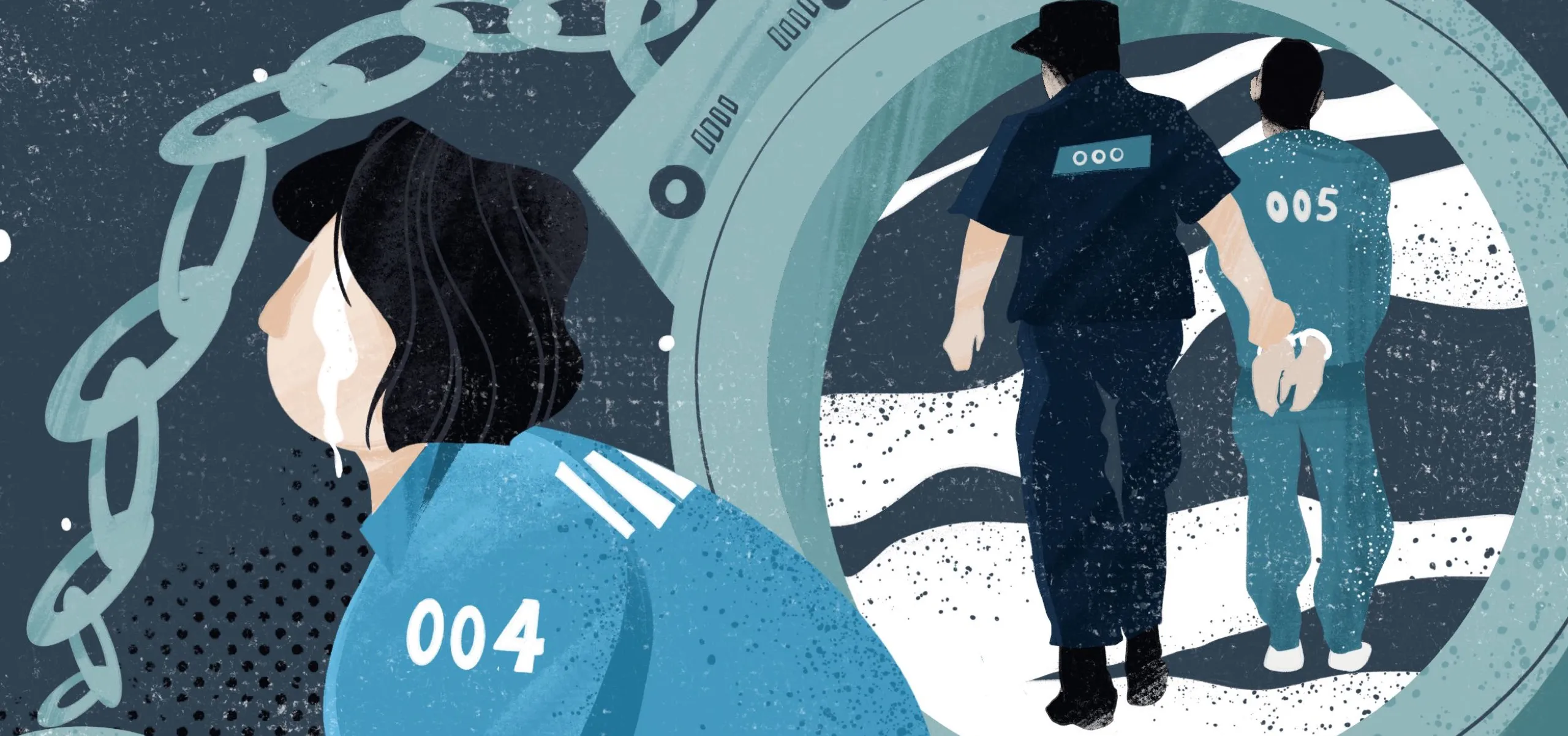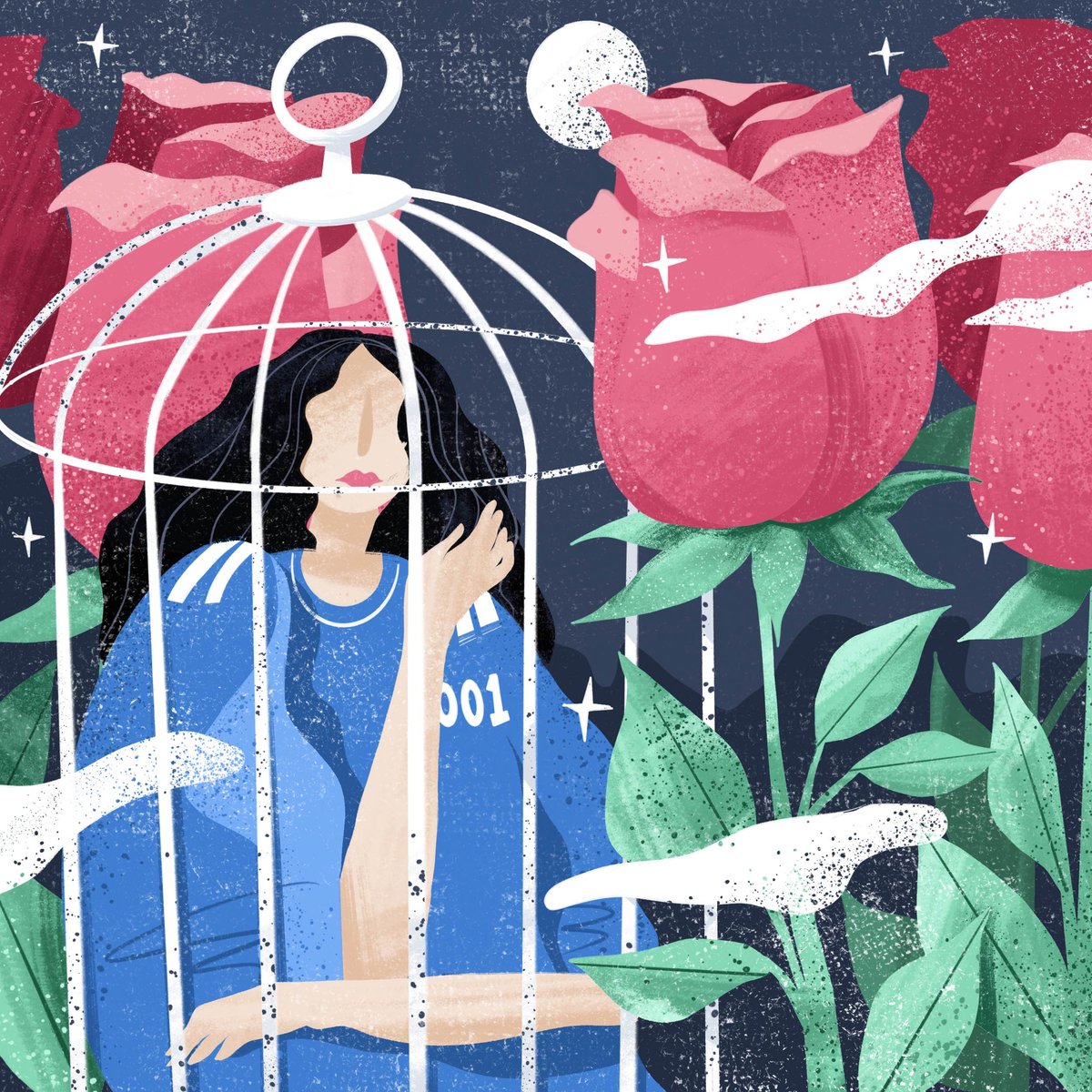Dealing with troubled pasts, endless waiting, and death sentences at a women’s detention center
-1-
The women in the detention center
My name is A-qiao. After graduating from police school, I chose to work in a detention center.
Even though everyone says that being a correctional officer is scary, I was young and wanted to prove myself, so I took the job. I ended up staying there for eight years.
Detention centers are temporary holding sites for suspects awaiting court judgment. The detainees have a very different mental state from prison inmates. In prison, the inmates know how long their sentences are, so they have something to look forward to. But in the detention center, facing an uncertain legal process, everyone is under a heavy mental burden. A lot of them can’t sleep at night. They don’t really talk about their worries while they’re inside—instead, they like to distract themselves with lighter topics, like, “that doctor today was so hot, that male officer is so hot”…that kind of thing.
People tend to think that women get all flustered when they run into trouble. But what I’ve seen is that, once they go into detention, many women suppress their feelings and do what they can to cope with their situation. But they’re still under enormous pressure. For the most part, women in the detention center stop getting their periods. Some of them might even go a year, two years, without their periods.
Many of them also gain weight. The most extreme case I saw was one woman gaining almost 8 kilograms in a month. When they feel empty emotionally, they eat. In addition to the food we serve them, they can use their own money to buy snacks at the snack counter; and repeat.
There was a period where, in order to provide them with some distraction, I took the electronic scale from the infirmary and moved it into the doorway of the common area, and had them weigh themselves one by one. Even though they wear loose clothing while inside, and don’t worry about looking nice, I found that they were just like any other women—they cared quite a lot about their weight.
During that period, everyone started competing to see who could eat the least, so their focus shifted in that direction.
-2-
A-mei’s story
A-mei was your typical Sichuan girl: clear pale skin, dark black hair, pretty, clever, and skilled in handiwork. At first, I couldn’t believe the crime she was charged with: bigamy.
I thought, bigamy is a civil offense, not criminal—why would she be in detention? Out of curiosity, I started talking with her, and she told me her story very matter-of-factly.
Her “husband” A-bao had already been married prior to getting together with her. His wife bore him four daughters, but he wanted a son. The two of them split without filing the official papers. After A-bao and A-mei met, they lived together as husband and wife and had a little girl together. After getting with A-mei, A-bao brought two of the daughters he had with his ex to live with them. But tragically, one day A-bao beat one of those daughters to death, so it became a criminal case.
When a stepmother and stepdaughter live together, if one day the child dies, people might instinctually blame the stepmother. But in this case it wasn’t A-mei’s fault; her neighbor could testify that she never hit the child. A-mei felt that at most, she had been negligent—she hadn’t been quite as good to her stepdaughters as she was to her own daughter.
But as A-mei tells it, A-bao was a monster. He treated his own daughters worse than dogs. His little girl was only 8 years old when he beat her to death. I saw the autopsy report, but I couldn’t bear to read it: The girl’s organs had ruptured and her body was covered in cigarette burns.
In the end A-bao got a heavy sentence—whether it was a life sentence or death penalty I can’t really remember anymore. But A-mei got only seven months.
It seemed to me that she had an easier time in detention than many others.
She was good with her hands, and did some very fun things with the limited resources in the detention center. For example, one time she roped everyone into making a “layer cake” out of steamed rice, decorated with raisins and crackers.
I once asked her what she did for a living, and she said she didn’t work because her husband gave her money.
At the time, I wanted to teach her a thing or two. I told her, “Women still need to make their own living. You can’t depend on men. When you get out you should find yourself a job and take good care of your daughter.”
She listened, but I don’t know if she took it to heart.
After A-mei got out, her WeChat Moments feed was full of pictures of her hands dripping in gold rings, of her partying it up with a bunch of men and going back to that lifestyle. Later, I deleted her from my contacts—I haven’t been in touch since. She’s set in her ways, but then, she’s not doing anything against the law. She’s getting by on her looks and charisma, even sending her daughter back to her hometown to be raised by her own mother. It was one way of living.
I remember when I was in school, I saw a TV drama about female criminals called Red Spider. I used to pity the women in “Red Spider,” but my “political” stance was clear-cut: they had to be reformed.
But after I started working and came face-to-face with actual suspects, I felt that I couldn’t apply my standards to everyone. A-mei had her personal philosophy and felt pretty good about her actions, and we simply couldn’t see eye-to-eye.
-3-
A-lian’s story
A-lian was from a remote village in our region, and didn’t speak standard Mandarin. Even though she was already 28 or 29 when she was detained and had a husband, she actually had the mental capacity of an 8-year-old.
She was sent in for stealing. Because she wasn’t so bright, the others would make her the butt of their jokes and bully her—they would put all her hair in these little braids. I was pretty upset when I saw this, so I told the ringleaders, “Stop messing with her, it’s not cool. She’s a person too, you know?”
Later on, while talking with A-lian, the other women began to suspect that her father-in-law would sexually assault her. The other detainees were no strangers to this kind of thing, coming from the underclass themselves, so they would joke about it. One day when I went into the common area, they said in unison, “Officer, wait a minute, we’re going to ask A-lian a question. Look, she’s so funny!” They asked her, “When your father-in-law does you, what sounds does he make?” And then A-lian imitated him.
This shocked and upset me.
It wasn’t A-lian’s choice to be part of the social underclass, but she was forced into it on account of her intellect. Although nobody can protect her for the rest of her life, I would put a stop to this kind of behavior when I noticed it.
I don’t know what A-lian thought about how she was treated, because when the others made fun of her, she would giggle along. Her actions were like a stream-of-consciousness. She wouldn’t say so much when I talked with her one-on-one, but I might be talking to someone else and she’d interrupt to tell me how this one dish we ate yesterday was good. She’s funny that way, but I don’t think it’s all that strange. I always responded to her.
One day, she ran over to tell me how tasty the melon seeds were from a shop back home, and I replied off-the-cuff, “I know that store, you should treat me next time I’m there.” And she said, “OK!”
Given A-lian’s intellectual disability, there wasn’t much they could do after detaining her, so pretty soon they let her out.
One day, they announced over the intercom that A-lian had come to see me. I hurried outside.
I saw her holding a bag of melon seeds, and she said, “Officer, for you.” I started tearing up right then. I asked her how she was able to come so far from home, and she said she took three buses to get here. She’d been on the road from morning until 3 in the afternoon to bring this gift to me.
Then she said she was going to go. Like a little kid, she said, “OK, I’m going home now.”
-4-
A-juan’s story
A-juan was a young woman serving a life sentence for drug trafficking. She was not at all what you might picture, but clean and fair, and very cute—everyone inside called her “Baby.”
A-juan had a tough lot in life. Because she was born with vitiligo, her parents sold her to a family in the Northeast. Later, the “auntie” and “uncle” that bought her got divorced, so she had been on the streets since junior high, spending her time with various boys. Her accomplice was also her boyfriend, who brought her into trafficking.
Normally, when I talked to detainees, I’d chitchat with them for a bit, and talk about what was happening outside. Usually, that made them feel some reconnection with the outside world, and their eyes would get a little brighter.
After I’d talked to A-juan several times, she asked me whether I could help her find her mother—it had already been over a decade since she’d seen her birth parents. She gave me the contact info for a classmate from her hometown, and that classmate had her mom’s phone number, so I was able to connect them with each other. After that, her mother and older sister came together to see her, but because the detainees aren’t allowed to have visitors, I had to go see them on her behalf. They brought her some clothes and money.
After I told A-juan about this, she burst out crying. She felt maybe it’s not that her family didn’t want her.
I found that she had always been a “tough girl,” projecting this cavalier, I-couldn’t-care-less attitude. But ever since she reconnected with her mother, she started trusting me more, and showed signs of wanting to do better.
From a more selfish point of view, I felt that if we got along better, it would make my job easier.
There is hierarchy in a detention center, with the inmates who were up for three- or four-year terms ranking below those with life sentences. A-juan had been there for a while and knew how things worked, so when she said something, it had an impact. For example, when she told everyone to settle down or they’d get docked points, the other detainees were mostly willing to listen.
The center set up a library where the detainees could take turns checking out books, but at first all the books they purchased were too highbrow, like biographies of Marie Curie and Gorkii. The women couldn’t really understand them.
Later, there was a series called Battle for the Skies that went around like wildfire. Since the detainees knew they were jail books, they didn’t take good care of them. They’d tear the books in two so that one person could read the first half and another person the second half, and then swap.
In order to get them the books they wanted to read, I got a card at the local library and checked out some mysteries and romances. I also bought them magazines, like Girlfriend. I told them I’d bought these for them, so they could read them whenever they want, even tear them apart if they like. But it was quite touching—A-juan set an example by taking good care of every book I brought in. The women made book jackets out of newspaper and also set up a checkout system.
Apart from this, officers were allowed to organize activities on the inside—singing, for example—as long as they weren’t illegal. A-juan was an avid participant in these activities.
I remember she sang this song for me, called “A Lover’s Heart.” She sang it quite well—I have a video of it saved.
Now, whenever I start singing this song, I think of her.
-5-
A-fei and her husband
A-fei came in as a middle-aged woman, not quite 50. She was short and stout, very down-to-earth, kind of like one of those hearty older women you meet on the street.
She had been a sex worker, while her husband was this clean-cut guy who worked security at a dancehall. But then he tied up a sex worker and killed her, so he’d been given the death penalty. Even though A-fei hadn’t participated in the murder, she was arrested for helping her husband cover it up.
A-fei was quite conscientious at heart—in the detention center, she was always very cooperative, even slipping me notes when she saw that people weren’t doing as they were told. For example, she told me there was a woman on daily blood pressure meds who would secretly toss out the pills the doctor gave her.
The fate of the detainees depends on the court’s ultimate ruling. Since the death penalty requires review by the Supreme People’s Court, the process could take some time. Meanwhile, any accomplices in the case had to stew in the detention center, waiting for the final outcome.
A-fei was being held up while her husband awaited his sentencing, unable to go to prison and serve her term, so her feelings were complicated. On one hand, she hoped the ruling would come down so she stopped being in limbo; on the other hand, her getting transferred would mean that her husband was about to be executed.
One day, when A-mei and I were on our way back to the common area after a chat, we bumped into A-fei’s husband. Because he was up for the death penalty, he wore leg irons and a different uniform from everyone else. A-mei was curious and asked me who that man was. Without thinking, I told her it was A-fei’s husband. When A-mei went back in, she told A-fei about meeting her husband, which immediately made her miss him.
Later, A-fei begged me, “Officer, could I ask you one favor? Can you set up a chance meeting for me and my husband? I won’t talk to him—just to walk by and look at him is enough.”
But encounters between detainees were heavily controlled, so I couldn’t agree to her request. The days went by, and eventually his death sentence came down.
Before he left the detention center, his correctional officer called him over and told him, “Your family is waiting for you outside. In a moment, when you go out, make sure you say what you need to say. I can only take you up to here.” But the convicted man only said, “Officer, thank you for looking out for me during this time. It’s okay, I’ll be alright.” As soon as he was done, the male officer broke down in tears.
Then A-fei’s husband saw me too, and waved. I told him not to worry, that I would make sure A-fei was transferred safely. He was so calm and collected, and expressed his gratitude where he felt it was owed.
After he was taken away, I went back to the women’s detention center to do roll call for the people going to prison that day. Out of consideration for A-fei’s emotional state, we hadn’t told her about her husband’s execution beforehand, so she didn’t know she was going.
When I read out her name, she froze. She said, “I’m going too?”
A couple of seconds later she realized what that meant, and fell to her knees with tears streaming down her face. Everyone in the room was shocked, and they all came up to comfort her. They did all her packing for her. Some of the other detainees even gave her their good clothes and shoes.
In the four hours it took to get from the detention center to the prison, A-fei cried the whole time, until her head hurt. It was pretty hard to watch—even though the rules say that detainees aren’t allowed to make phone calls, I told A-fei she could use my phone to call her family. But she turned me down, saying that she had already prepared herself for this day countless times, but it still felt too sudden.
I also thought a lot about the death penalty, and what I would do in the same position. I would certainly not be in control of my emotions. Facing such unbearable grief, it’s hard to say what I would do.
Later I talked to an old correctional officer who’d spent many years working with death-penalty inmates. He said that many of them lived simply while they waited for their execution—eating when they were hungry, sleeping when they were tired, and not dwelling on anything. We don’t know what kind of horrors they went through while they were alive, so maybe, for them, death is a kind of release.
-6-
I see them in my dreams
I knew from the start that the people in detention centers are real, live people—it’s not like once you’ve put a criminal label on them, they become monsters.
Detainees have told me before that some of the guards refuse to even touch their belongings. But when I was inside, I would sometimes sit on their beds to talk. Or sometimes when they made treats, like A-mei’s rice “cake,” they would invite me over. I thought the food was pretty good.
They said the reason they trusted me was because I saw them as people.
Later on, due to departmental restructuring, I was transferred out of my position at the detention center, and so my correctional career ended.
Even though I’ve already left, I still see these women in my dreams. I dream that I’m a guard again, that some of the women would run over to tell me about their day—maybe they had points docked for some reason, or they’d written up some reports to give me to read.
I think these experiences will always stay with me. They’re not over yet.
Translated by Nathaniel J. Gan
___
This story is published as part of TWOC’s collaboration with Story FM, a renowned storytelling podcast in China. It has been translated from Chinese by TWOC and edited for clarity. The original can be listened to on Story FM’s channel on Himalaya and Apple Podcasts (in Chinese only).
















